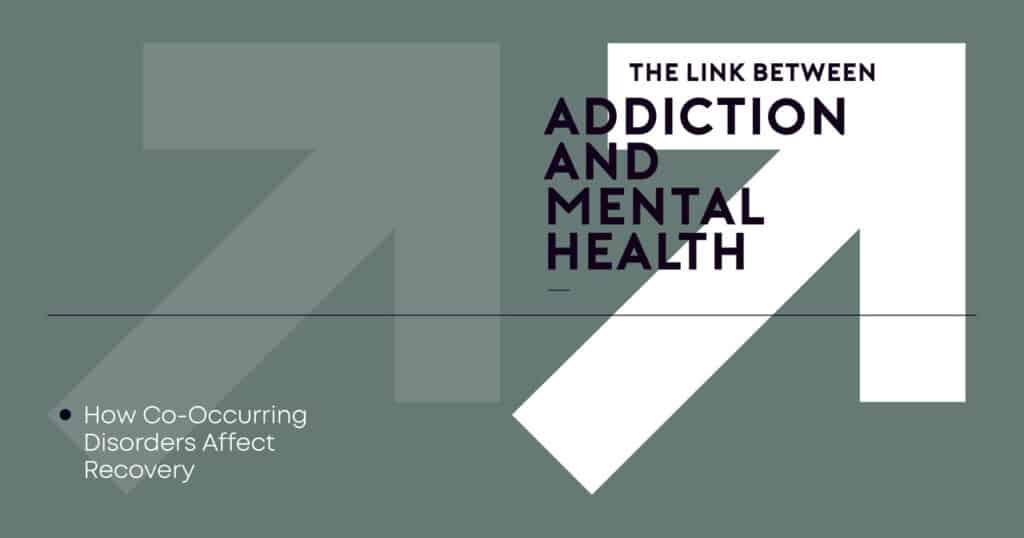For anyone navigating the complex waters of recovery, understanding the intricate relationship between addiction and mental health is vital. Whether affected directly by addiction, having a loved one afflicted, or playing a helpful role in a person’s life, knowing these two elements ultimately come together can undoubtedly be transformative.
Key Takeaways
- The intricate connection between addiction and mental health cannot be overlooked; these two aspects influence and intensify one another, underscoring the importance of comprehending their relationship.
- An integrated treatment approach is then clearly necessary, since successful recovery from co-occurring disorders requires rehabilitation both of addiction and mental health.
- It is fundamental mainly because recovery is a journey that requires a continuation of solid support networks, self-care, and continued check-ins about mental health.
Let’s break this significant topic into pockets and speak to it in a friendly yet enlightening manner.
Understanding Addiction
What Is Addiction?
In the realm of medicine, addiction is commonly known as substance use disorder. This state of finding oneself irresistibly drawn to rewarding stimuli, even in the face of adverse consequences, should not be mistaken merely for the consumption of drugs or alcohol. It encompasses a profound psychological component wherein the brain’s reward system is effectively hijacked, leading one into a relentless cycle of dependence.
One more reason why addiction is often perceived in the light of legal substances is the no doubt presence of addiction in booze and prescription drugs, extending even to behavioral addictions like gambling or gaming. It is, therefore, very important to understand that addiction can happen to anybody at any age, irrespective of their gender, social standing, or anything else.
Common Types of Addictive Substances
When discussing addiction, we often refer to several categories:
- Substances:
- Alcohol: Often seen as socially acceptable, it can lead to significant dependence and health issues.
- Illegal Drugs: This includes substances like cocaine, heroin, methamphetamine, and ecstasy, which have high addiction potential.
- Prescription Medications: Drugs intended for therapeutic use, such as opioids, benzodiazepines, and stimulants, can become addictive when misused.
- Behavioral Addictions:
- Gambling: This addiction can lead to severe financial and emotional consequences.
- Gaming: With the rise of online gaming, many individuals experience addiction to video games, which can disrupt daily functioning.
- Social Media: Increasingly, people are recognizing the compulsive use of social media platforms as a form of addiction.
Understanding these categories is the first step toward addressing the issue effectively.
Understanding Mental Health
What Is Mental Health?
Mental health encompasses our emotional, psychological, and social well-being. It affects how we think, feel, and act. It also influences how we handle stress, relate to others, and make choices. Mental health is crucial at every stage of life, from childhood and adolescence through adulthood.
The Spectrum of Mental Health
Mental health, in many ways, encompasses everything. On one end, you would find people doing marvelously; on the other, some would be dealing with extreme challenges. Mental health conditions, such as anxiety disorders, depression, and post-traumatic stress disorder, can result from a combination of factors, including genetics, environment, and trauma.
Many people will have periods of mental illness, while others might require ongoing therapy and support. Knowing where an individual falls along this continuum is critical to providing the appropriate treatment and support.
The Connection Between Addiction and Mental Health
How Addiction Can Affect Mental Health
Addiction is not an independent phenomenon, but it strongly influences the psychological state of the individual. The changed mechanisms of brain reward, which appeared with the use of psychoactive substances, may be accompanied by unpredictable mood fluctuations and anxiety, so it is generally unfavorable for a person’s condition in life. Chronic alcoholism, for example, can sometimes induce depressive states and stimulation, provoking anxiety or paranoid attacks.
At times, it seems almost impenetrable, the stress and emotional turmoil a person gets bogged down in the seemingly endless cycle of addiction. This person tries to find ways to tame their stress and emotions better through these substances, creating a vicious circle where psychological disorders spawn addiction, and addiction feeds back into those disorders.
How Mental Health Can Affect Addiction
Others might resort to substance use because they have undiagnosed mental disorders. These are most commonly anxiety, depression, and trauma-related mental conditions. For example, an anxious person may try to self-medicate by using alcohol or prescription drugs in a desperate attempt to reduce feelings, thus becoming addicted over time.
The interplay between the two conditions makes their identification crucial for proper and effective treatment. Treating one condition in isolation is not sufficient; instead, it would be inefficient, as the other condition would impede recovery.
Co-Occurring Disorders
What Are Co-Occurring Disorders?
Co-occurring disorders, commonly known as Dual Diagnosis, are characterized by the presence of a substance use disorder and a mental health disorder at the same time. According to statistics, almost 8 million adults in the U.S. are estimated to be suffering from co-occurring disorders, highlighting how much treatment needs lie ahead.
People with co-occurring disorders, however, present a different kind of complexity. The symptoms often run together; hence, treatment is much more cumbersome. For instance, depression covers the specific underlying reasons for substance use. Therefore, it may be much harder to determine where and how best to begin.
Challenges of Co-Occurring Disorders in Recovery
Addressing co-occurring disorders presents a complex challenge, for the symptoms of addiction often obscure the manifestation of mental health issues and vice versa. Effective treatment demands a tailored approach that thoughtfully considers both aspects:
- Stigma. This surrounds addiction and mental health issues, causing many individuals to hesitate in seeking help. As a result, they may experience feelings of shame and isolation, which can further complicate their journey to recovery.
- Treatment Availability. Not all treatment centers are equipped for working with co-occurring disorders. Many facilities specialize in either substance abuse or mental health, often leaving patients without the comprehensive care they need.
- Integrated Treatment Necessity. To attain enduring recovery, it is essential to embrace integrated treatment models that confront both the addiction and the underlying mental health conditions concurrently.
Effective Treatment Approaches
Integrated Treatment Models
The interactional treatment models acknowledge that addiction is heavily intertwined with mental health issues; hence it is crucial to treat both simultaneously. Generally, these models combine the necessary therapies and counseling while trying to include medication management to fit the needs of the individual.
- Multidisciplinary Teams. Collaboration among psychiatrists, psychologists, addiction specialists, and social workers can provide comprehensive care that considers all aspects of a patient’s well-being.
- Holistic Practices. Exercise, such as yoga and other mindfulness practices, and nutrition can also help support mental health and recovery.
Types of Therapies
Several therapeutic approaches have proven effective in treating co-occurring disorders:
- Cognitive Behavioral Therapy (CBT): This evidence-based approach helps individuals recognize and change negative thought patterns and behaviors associated with both addiction and mental health disorders.
- Dialectical Behavior Therapy (DBT): Originally developed for borderline personality disorder, DBT is effective for managing emotions, improving relationships, and reducing self-destructive behaviors.
- Group Therapy and Support Groups: Engaging with similar experiences can foster community support and understanding. Groups like Alcoholics Anonymous (AA) and Narcotics Anonymous (NA) can provide invaluable encouragement and accountability.
Medication-Assisted Treatment (MAT)
For many people, medication plays a very crucial role during recovery. MAT refers to the use of drugs in liaison with counseling and behavioral therapies. It is especially effective for those dealing with opioid addiction because medicines like methadone and buprenorphine come to help with the cessation of cravings and withdrawal signs.
Moreover, psychiatric medications might be prescribed to tackle the underlying mental health challenges, enabling individuals to immerse themselves more thoroughly in their journey of recovery.
Strategies for Recovery
Building a Support System
A solid support system is crucial for anyone in recovery. Whether it’s family, friends, or support groups, having people who understand and empathize can make a significant difference. Support groups provide a safe space to share experiences and learn from others on a similar journey.
Self-Care Practices
Taking care of your physical and mental health is essential during recovery. Here are some self-care practices to consider:
- Mindfulness and Meditation. These practices can help reduce stress and anxiety while promoting self-awareness and emotional regulation.
- Physical Activity. Regular exercise releases endorphins, which can boost mood and overall well-being.
- Healthy Routines. Maintaining a balanced diet, getting enough sleep, and establishing daily routines can provide structure and stability during recovery.
Ongoing Mental Health Maintenance
Recovery doesn’t end after initial treatment; ongoing mental health maintenance is vital. Regular therapy sessions, support group participation, and check-ins with healthcare providers can help individuals stay on track and address emerging issues before they escalate.
Resources for Help
Finding the Right Treatment Center
Finding a facility specializing in co-occurring disorders is essential when seeking treatment. Here are some tips for choosing the right treatment center:
- Research Credentials. Look for licensed and accredited facilities with experience treating addiction and mental health issues.
- Ask About Integrated Programs. Learn about integrated programs’ approach to treating co-occurring disorders and the types of therapies they offer.
- Read Reviews. Testimonials from former patients can provide insight into the quality of care provided.
Online and Community Resources
Many organizations and resources are available to help individuals struggling with addiction and mental health issues:
- National Alliance on Mental Illness (NAMI). Offers information, support, and advocacy for individuals affected by mental illness.
- Substance Abuse and Mental Health Services Administration (SAMHSA). Provides a national helpline and treatment locator for substance use and mental health disorders.
- Local Support Groups. Check local listings for support groups in your area that focus on addiction and mental health.
Final Thoughts
Understanding the connection between addiction and mental health is essential for adequate recovery. Co-occurring disorders pose unique challenges, but with the right support and integrated treatment approaches, individuals can work towards healing and a healthier future.
If you or someone you know is struggling with addiction and mental health issues, don’t hesitate to reach out for help. Recovery is possible, and support is available.
FAQs
- What are co-occurring disorders?
Co-occurring disorders refer to the presence of a substance use disorder combined with a mental health disorder within one individual.
- How do addiction and mental health interlink with each other?
Addiction has the potential to spawn mental health issues, whereas untreated mental health conditions may drive individuals to self-medicate with substances in response, creating an unhealthy cycle of dependence.
- What is integrated treatment?
Integrated treatment is an approach that deals with both mental health and addiction at the same time, often involving a team of professionals.
- What therapy would be the best treatment for comorbid disorders?
The most commonly used therapeutic interventions include Cognitive Behavioral Therapy (CBT), Dialectical Behavior Therapy (DBT), and Group Therapy.
- What could one do to seek the right treatment center for co-occurring disorders?
Find licensed and accredited facilities that specialize in co-occurring disorders, then ask for options on how they integrate treatment programs.












